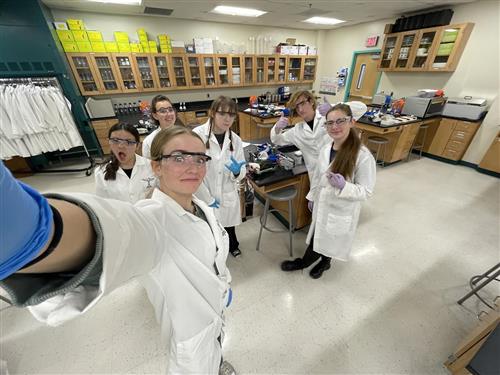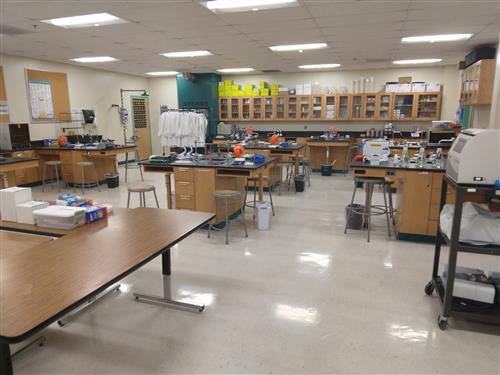- Ironwood Ridge High School
- Bioscience II
Manno, Theodore
Page Navigation
- About the Teacher
- Contact Info
- Bioscience I
- Bioscience II
- Bioscience Internship
- Biology (General)
- Nighthawk's Nest Biotechnology News
- Laboratory Gallery
- Classroom Gallery
- Nighthawk Chess Collective
- Nighthawk Origami & Tangram
- The Nighthawk Phylogeny Project
- Nighthawk Proteomics Institute
- Biostatistics @ The Nighthawk's Nest
- Ironwood Writer's Workshop
- The Ridgewood Methods
- Nighthawk Biotechnology Class Mascots
- Nighthawk Biotechnology In Action--Video Montage
-
WELCOME TO NIGHTHAWK BIOTECHNOLOGY: NEXT GENERATION
WE ARE THE FUTURE, AND THE FUTURE IS NOW
BIOSCIENCE II
Bioscience 2 is an inquiry-based laboratory course that encourages high-level critical thinking, problem solving, collaboration, and leadership. Students will expand on their knowledge of biotechnology and scientific research. The class will conduct scientific experiments, use sophisticated equipment, and analyze data while becoming proficient in laboratory skills that may lead to further exploration of contemporary topics in the field at the post-secondary level. Additionally, students will assume more responsibilities in the everyday operation of the biotechnology lab. As a capstone experience, students will conduct independent lab research and write a full-length scientific paper with a literature review and statistical analysis that can be submitted to a local competitive science fair.

Nighthawk Biotechnology: Next Generation operates as a laboratory in academia under the auspices of a primary investigator, with students essentially taking on the role of graduate assistants. This is a college-level course (Prerequisites: Completion of 9th grade Biology and Bioscience I) and dual enrollment credit is offered through the University of Arizona (MCB 102). Students will explore career opportunities in the biotechnology and pharmaceutical industries. Unlike some other area high schools, this college-level, dual enrollment, pathway-completing course can be taken as early as 11th grade, and may also be completed during 12th grade.
Our curriculum is based upon the Arizona Department of Education Science Standards and the Academic Standards of the Amphitheater Public School District. The class is designed to help students develop an interest in science and learning, to become scientifically literate citizens, and to operate in contemporary society as effective thinkers and problem solvers. Accordingly, Amphi’s “Picture of a Graduate” mission will drive classroom expectations and goals. Thus, students will be expected to not only learn academic content, but also to demonstrate proper citizenship, communicate consistently and clearly, think creatively and critically, care for themselves and one another, and collaborate to solve problems in the context of the fields of biology and science.

The lab facilities available at Nighthawk Biotechnology in "The Room" (A232) are cutting edge, including cell culturing equipment, multiple centrifuges, incubators, and autoclaves of various sizes, several temperatures for refrigeration and freezing, spacious lab stations, an electrophoresis gel viewer with software, a thermal cycler, a MilliQ distilled water fountain, electric pipet fillers, Biological Safety Cabinets, and a massive stock of restriction enzymes, bacterial cultures, plasmids, RNA primers, polyermase, buffers, and other specialized chemicals. Our classroom features large triplicate HDTV screens, Virtual Reality headsets, a high-quality audio system, and modern bioinformatics software.
Bioscience 2 students build on their knowledge from previous courses through involvement with the following projects:
- DNA Sequencing (Sanger, through University of Arizona Genetics Core)
- Gene Editing with CRISPR
- Specialized cell culturing
- Advanced bacterial transformations (pGLO-plasmid green fluorescent bacteria)
- Buffer and solution preparation
- BLAST and MAFFT DNA alignment
- SMS Nucleic Acid Translation
- Use of NCBI and DNA Subway
- Phylogenomics
- Protein Visualization and Analysis using RCSB Protein Data Bank (PDB)
- Phylogeny creation using FASTA data
- ab1. and seq. nucleic acid sequence files
- DNA Spectrograms with Four Peaks Software
- Use of Gel Viewer Software
- 3D Protein Structure Visualization and Molecular Modelling with JMOL
- Advanced DNA Extraction methods
- Protein Chromatography and Separation
- SDS-PAGE (Proteomics Labs)
- Statistical Analysis (t, R-squared, chi-squared, boxplots, P-values, distributions)
- Full-length scientific paper composition and simulated peer-review
Highlights of the class will also include independently conducting advanced protocols involving the following procedures from Bioscience I:
- Pipetting
- Centrifugation
- Macromolecule Identification
- Nucleic Acid Extraction
- Cheesemaking and Juice making with enzymes
- Cell Identification using Gram Staining
- Microscopy
- Yogurt making using probiotic fermentation
- Spectroscopy
- Cell culturing using agar and differential media
- Restriction Enzyme Digestion
- Gel Electrophoresis
- Polymerase Chain Reaction (PCR)
- Forensic Identification of RFLPs (Restriction Fragment Length Polymorphisms)
- Bacterial Transformations with pGLO plasmid
- BLAST and DNA code alignment
- Phylogenomic Analysis and Taxonomy creation
- Modelling Population Dynamics
- Identifying GMOs using genetics
- Bioremediation using transformed bacteria
Students begin to examine career options in the sciences and form additional ideas for the Independent Projects they will conduct as Bioscience Interns. Students are also encouraged to involve themselves in local science initiatives, such as SARSEF (Southern Arizona Science Fair), HOSA (Health Occupations Club at IRHS), Univ. Arizona KEYS (intensive summer program), and Univ. Arizona STAR Labs (intensive program afternoons during the school year), especially if they are in their senior year at IRHS.
At Nighthawk Biotechnology: Next Generation, we build the scientists of the future by providing IRHS graduates with the technical, communication, and leadership skills that prepare them for the research and allied-health opportunities that will be available for years to come. Come join us! The future is now.

